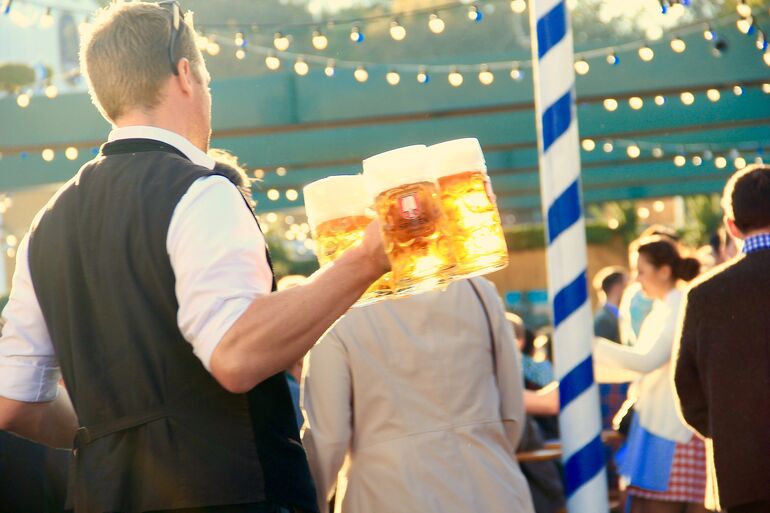Start 14-Day Trial Subscription
*No credit card required

10 Ways Drinking Beer May Actually Be Good For You
Here are ten reasons why, when consumed in moderation, beer is not harmful to your health. Please keep in mind that this is not an invitation to drink, particularly if you are a teetotaler or have a medical problem.
1. Beer consumers have a longer lifespan
Moderate drinking is beneficial to your health, and beer is an excellent choice for moderate drinking. Everyone is aware that excessive drinking is harmful to one's health. Let us not sugar-coat it: if you are drunk, you will run into things, drive into things, and develop esophageal cancer, cirrhosis, and other serious illnesses.
However, medical evidence is increasingly indicating that not drinking at all is harmful to your health. Moderate drinkers, according to several independent studies, live longer and live better than drunks or teetotalers. Tim is one of the nursing essay writers and he says that beer is ideal for moderate drinking since it contains less alcohol and has a bigger volume than wine or spirits.
"Beer, if taken in moderation, softens the temper, brightens the soul, and improves health," declared that old radical Thomas Jefferson. It did not need scientific research to convince him of that.
2. Beer is a completely natural product
Some beer experts may warn you that it is full of additives and preservatives. Beer is, in fact, as natural as orange juice or milk (perhaps even more so – some of those milk and OJ labels will surprise you). Beer does not require preservatives since it contains natural preservatives in the form of alcohol and hops. Beer is "processed" in the same way that bread is: it is boiled and fermented before being filtered and packed. Heineken is in the same boat.
3. Beer is minimal in calories, carbs, fat, and cholesterol and has no fat or cholesterol
Beer has a lot of low-calorie choices for a fully natural beverage. Twelve ounces of Guinness provides around 125 calories, which is the same as 12 ounces of skim milk. That is fewer calories than orange juice (150), which is roughly the same as a regular "full-calorie" lager.
If beer were your only source of sustenance, you would have to consume one per waking hour to meet your daily calorie needs (2,000 to 2,500). And no one is advising you to consume that many. Plain tea, black coffee, and water are the only natural beverages with fewer calories than beer. Sam takes assignment help online and he says that per 12-ounce serving, the average beer has around 12 grams of carbohydrates.
In a 2,000-calorie diet, the Recommended Daily Allowance for carbs in the United States is 300 grams. To put it another way, you would have to drink an entire 24-pack case of beer – and then reach into another case – just to meet the government's suggested daily carbohydrate intake.
If you want to carbo-load, it is best to eat an apple or drink some soda pop. Each contains 35 to 40 grams of carbohydrates, which is three times the amount contained in a beer. Beer also has no fat or cholesterol.
4. Beer lowers cholesterol levels
Beer does not just have cholesterol; cholesterol in your body may really be improved. In truth, your HDL/LDL cholesterol ratio is tilt correctly, consuming beer frequently and moderately. You have two types of cholesterol in your system: HDL, the 'good' cholesterol that smooths your veins and flows, and LDL, the 'bad' cholesterol in your veins, like lobster in your bath drain. The system is flowing via the beer power and maintaining the HDL levels. Some studies show that your HDL might grow by up to 4 percent per day with as little as one drink.
5. Beer helps you relax and help increase concentration
The social components of moderate drinking are undeniably health-promoting. To put it another way, you should get out every now and again and unwind with your friends over a few drinks.
6. Beer is high in B vitamins
Despite years of anti-alcohol groups suppressing these findings, beer, especially unfiltered or barely filtered beer, turns out to be extremely healthy. Beer has a lot of B vitamins, including folic acid, which is thought to prevent heart attacks. Beer also contains soluble fiber, which helps to keep you regular and lowers the probability of your system absorbing harmful substances like fat. Rey needs chemistry homework help and he says that in case you were planning on metal-plating your stomach, beer also contains substantial amounts of magnesium and potassium.
7. Beer can be a better option than water
If you are in an area where it is forbidden to drink the water, local beer is always a better bet. It may be even safer than the bottled water available in the area. Beer is boiled during the brewing process and maintained clean until it is capped and sealed, because if it isn't, it will go bad in obvious ways, making it hard to sell. Even if it spoils, there are no pathogens (bacteria that cause disease) that can live in beer. So go ahead and drink - even poor beer is better than water.
8. Beer helps to keep heart attacks at bay
If you are looking for something a little more cutting-edge than vitamins, beer has plenty to offer. Have you heard of the French Paradox, where the French eat their lovely high-fat diet, drink their lovely high-booze diet, and smoke their horrible goat-hair cigarettes, yet have heart disease rates that are around one-third of the rest of the world? It has been attributed to the antioxidants found in red wine. Guess what else has as many antioxidants as red wine? Dark beer!
9. Beer keeps cancer at bay
The most astonishing beer-health connection is a flavonoid found solely in hops called xanthohumol. According to Dr. Cristobal Miranda of Oregon State University's Department of Environmental and Molecular Toxicology, xanthohumol is a powerful antioxidant that inhibits cancer-causing enzymes and is "far more effective than the main component in soy." The Germans have created a beer with higher amounts of xanthohumol because it is so healthy for you.
10. You do not get a beer belly by drinking beer
According to the researchers, there is a widespread belief that beer drinkers are more 'fat' than non-drinkers, wine drinkers, or spirits drinkers. However, they discovered that any link between beer and obesity, if it exists, is likely to be weak. People who drink beer on a regular (and reasonable) basis not only do not have beer bellies, but they also weigh less than non-drinkers, according to most research.



